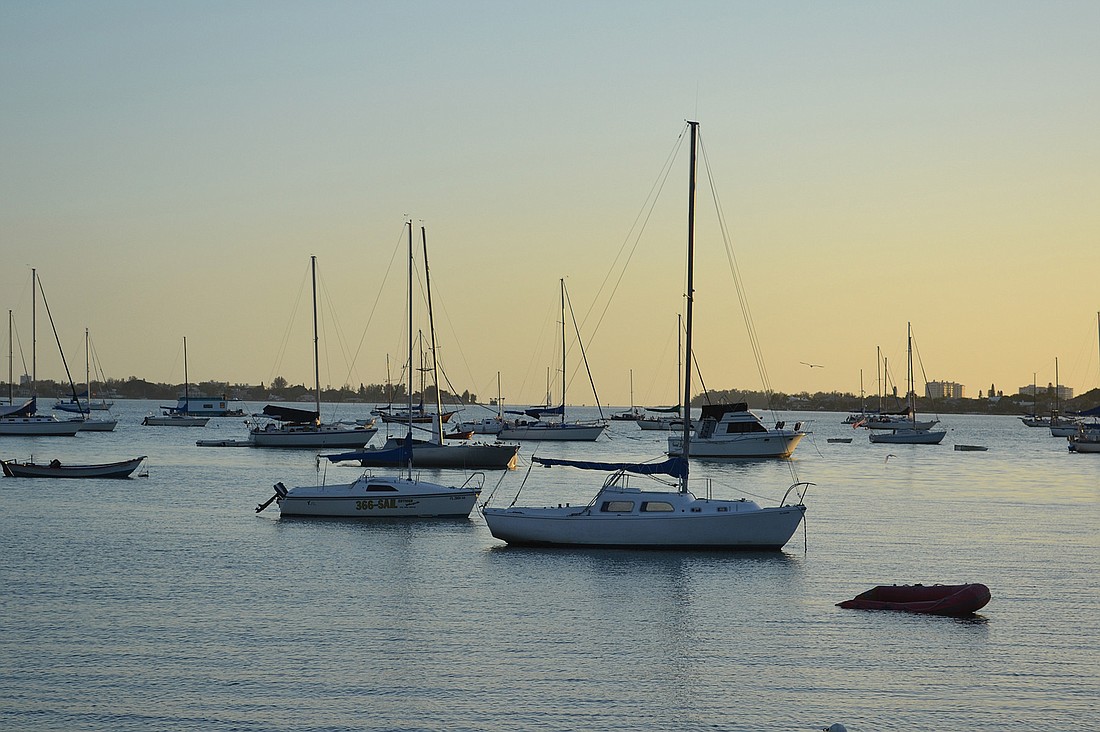- April 16, 2024
-
-
Loading

Loading

Approximately 75 boaters filled City Hall last week to let city staff know they don’t want to be told what to do in Sarasota Bay.
During a public workshop Nov. 3, city residents and boaters were encouraged to comment on regulations for a proposed bayfront mooring field near Marina Jack that calls for construction of 35 mooring balls to be secured by chains at the bottom of Sarasota Bay.
The workshop also was designed to get feedback on how the city should manage boats that want to anchor for free outside the proposed mooring field, whose construction is scheduled to begin next month.
Currently, cities and counties in Florida have no control over where boats can anchor and for how long the vessels can stay offshore. But the city of Sarasota is one of five locations picked to be part of a new state pilot program to formulate written regulations for boat mooring.
Mooring Project Manager Tony Russo explained that new rules are being written for both the future bayfront marina and the current Sarasota Sailing Squadron mooring field.
“This discussion will help shape the waters outside of mooring fields and how we control them,” Russo said.
But boaters at City Hall made it clear last week they weren’t interested in being part of a test and didn’t want the city regulating where they can anchor their boats.
“Once upon a time, a person could live on a boat as long as they wanted and have much more privacy than they would on a downtown park bench,” said boater Pete Tyson. “Please don’t give boaters further regulation.”
Although Russo explained that part of the reason for shaping regulations was to control derelict boats that are left behind in the waters, some in attendance questioned whether that was an issue.
From 2004 to 2007, the Sarasota Police Department tagged and hauled away 160 derelict boats at a cost of $150,000. The expense was covered through Florida Fish and Wildlife Conservation Commission grants. It cost about $1,000 to tag and tow away each derelict boat. Any boat that cannot move freely under its own engine power is deemed to be derelict.
“My solution would be no time limits on anchoring outside of the mooring field,” said boater Scott Keddy. “You need a harbor master who can control how close the boats get to the mooring field, and if a boat causes a problem or becomes derelict, it can be quarantined off and hauled away.”
Boater Patrick Egan told those in attendance that he can’t afford to pay approximately $300 per month to rent a permanent mooring fixture in the future mooring field.
“If my wife and I can’t anchor outside of the field, we will have to sell our boat,” Egan said. “I urge you to put as long a time frame as you can on anchoring time limits.”
David Kennedy, a representative from BoatUS, the Boat Owners Association of the United States, agreed with the assessments from local boaters.
“Your ordinance needs to allow boaters to have a safe place to anchor close to facilities,” Kennedy said. “You have to offer both paid and free choices for boaters and don’t create a revenue source for the city.”
Russo said the city would not make money off the proposed mooring field.
“The Department of Environmental Protection has supplied a grant for this project that makes it clear that the only money made from the field must be used to pay for the field and its upkeep,” Russo said. “This can’t be a moneymaker for the city.”
Paul Gilbert, a boater who for the last 45 years has anchored every winter off Sarasota Bay, said a boater needs the option to anchor outside a mooring field.
“We also need the ability to stay as long as we would like,” Gilbert said. “I object to having my rights as a legitimate cruising sailor threatened and want the freedom to come and go as I please as I continue to spend money in your fair city.”
That statements and others like it were met with applause from the boaters in attendance.
Russo said the city staff understands the boating community’s concerns. “In December, we will present our findings to the City Commission and you will have an opportunity to make your voices heard again at two more public hearings,” Russo said.
The new mooring field is expected to be operational in spring 2012. Plans call for Marina Jack to manage the harbor area, where vessels will hook up to the mooring balls. Marina Jack staff will collect rent, provide restrooms and shower and laundry facilities and pump out sewage holding tanks, as well as ferry ashore boaters who have moored in the city field.